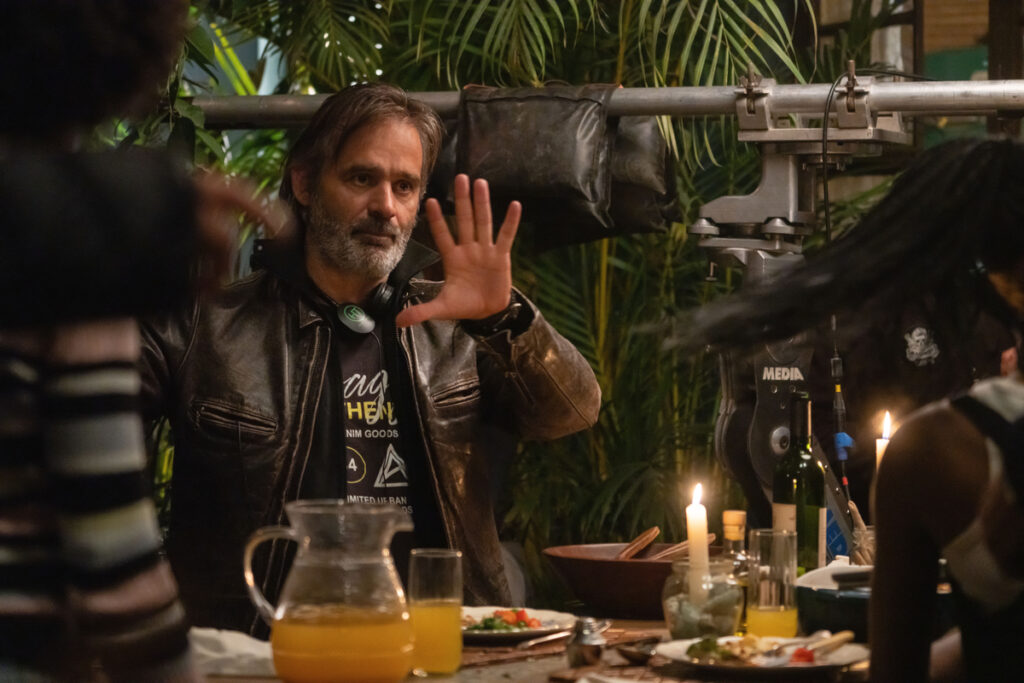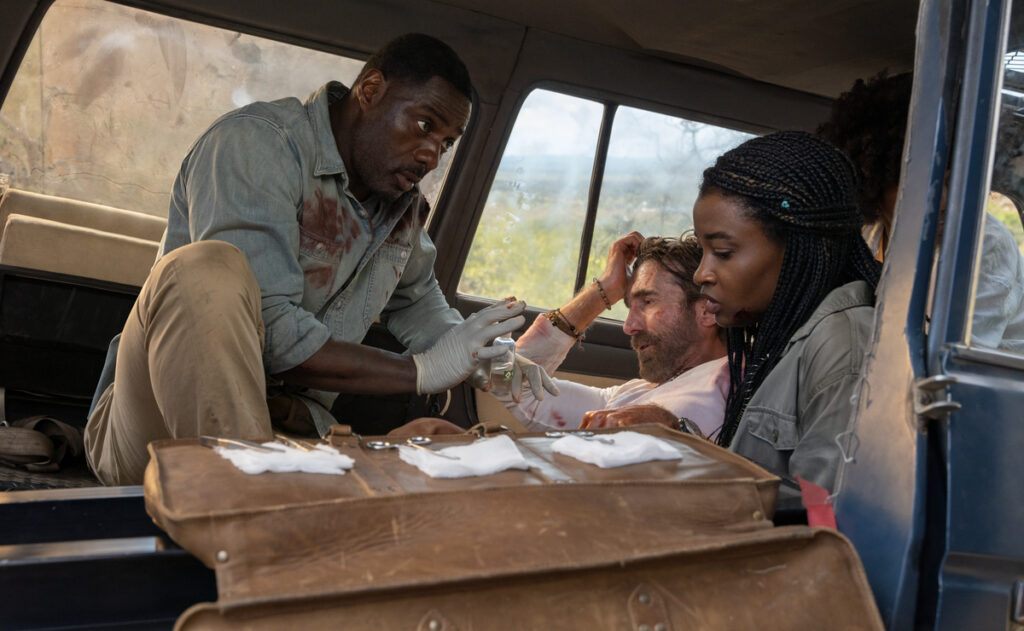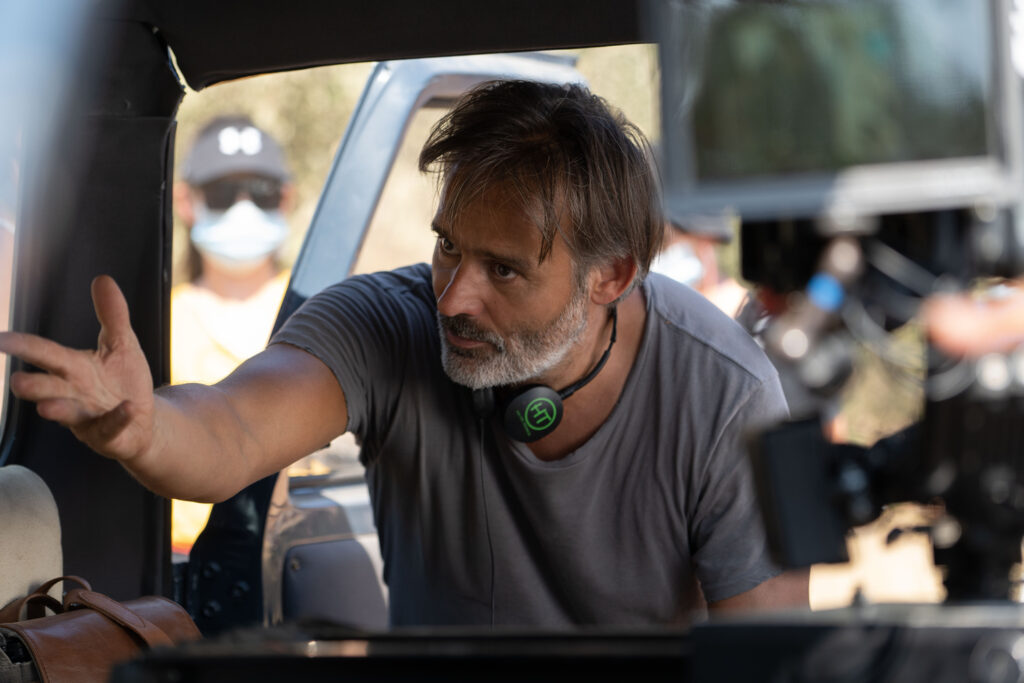In Beast, recently widowed Dr. Nate Daniels (Idris Elba) and his two teenage daughters (Iyana Halley and Leah Sava) travel to a South African game reserve managed by Martin Battles (Sharlto Copley), an old family friend and wildlife biologist. However, what begins as a journey of healing soon turns into a fearsome fight for survival when a lion, the sole survivor of an poaching attack, begins stalking them.
Ahead of Beast’s release in the UK, Outtake spoke with Icelandic director Baltasar Kormákur – known for his films Contraband, 2 Guns (starring Mark Wahlberg and Denzel Washington), Everest, and Adrift – about filming on location, pitting Idris Elba against a CGI lion, and the enduring appeal of ‘Man vs Beast’ movies.

What convinced you to get involved when you were first offered the project?
The idea of shooting something in Africa and getting out in the bush was very exciting. I’d never been to Africa before, and it was something I had dreamt of since I was a child. When I told my parents about this [Beast], my mother brought out this little clipping book with cuttings of African lions I’d been building as a kid. So, I’d already done my research when I was six years old, even if I did update it for the film [laughs].
What I like about being a filmmaker is that you get to study the subject at length. When I did Everest, I researched everything about the people going up there, the mountains, everything. In this case, I got to study the behaviours of lions and how they move around and attack. It was a great opportunity.
We read that you were the one who asked the studio to film on location. Why was that so important?
It was essential for me because I wanted to create a baseline for the movie. If the environment is real, it doesn’t stick out like a sore thumb when you bring the lion into the environment. Often, when I see those movies – you see those Marvel movies or something – they’re not real. And that’s fine because they don’t need to be, but there’s no real feeling of threat. The actors wear a lot of makeup, their hair is combed, and you’re shooting something in Atlanta that’s meant to be in Africa; the vegetation isn’t right, and it just feels wrong. For example, Black Panther was shot in Atlanta; for me, it doesn’t have that African feel.
You talk about making the film look genuine and authentic, but the titular Beast is designed to be far more threatening than your typical lion. Why did you decide to make him this way?
Well, it is based on a real lion, Scarface, that we used as our model. I’d rather have a lion with character than one that’s just vanilla, but it is very much based on real life. We made him as big as a lion can get, but not big like a truck, which is often the temptation in those movies. For me, it’s about making him as real as possible, which is why he’s ripped, hungry, and bruised. I was trying to create a beast in pain and angst rather than some heavy monster.

Idris Elba was already loosely attached to the project when you were approached, which must have been a big draw. Why did you think he was the right fit for the role of Nate?
First of all, he is, like me, a father. So that experience with those relationships fed into the role, and he had that vulnerability. He’s also a great actor and a movie star. I felt like he delivered both sides of the card: I didn’t want him to come off as a superstar and as somebody ready for this fight from the beginning. It’s more like he grows into it because of necessity.
Over your career, you’ve directed several films exploring the relationship between man and nature. As a filmmaker and movie lover, why do you think the ‘man vs beast’ premise still appeals to audiences?
I think that, in some ways, we’re very animalistic. Yes, we use culture to try and control those instincts, but I think these films draw us back to that. For me, it’s always refreshing, and there’s something very visceral about it. I also believe we need nature around us. When we get too far from nature, I think we start to degenerate; a part of ourselves gets lost. I have horses in my garden, chickens, and a cat and dog, and that’s the life I choose. I think that people in big cities crave that and will try to rebuild that connection by getting a dog or other animal. The more we lose that, the less human we become.
People are drawn to it. But I’ve been called many things – I did a black comedy at the beginning of my career and called 101 Reykjavik, and people said it was “Almodóvar on ice.” I did a family drama with The Sea, and people said I was the Icelandic Ingmar Bergman; then I was the action guy and the survival guy. I like the challenge of constantly changing. I didn’t set out to make one kind of film; I choose what appeals to me and try to make the best film possible.

What did you find most challenging about Beast?
The challenge is also the pleasure. Shooting it in the savannah was challenging, especially in the middle of COVID. And I chose to shoot it in long takes to create a claustrophobic atmosphere, which was very difficult for everyone. I wanted you to feel like you were stuck in the car with them, to experience the situation they’re in and keep the feeling of anticipation relentless. But of course, that was very challenging, and you’re always a little nervous about it. Especially in the night-time, you have to do a 360, with no lights or resources, and then you have to light Black actors in a dark environment. It’s not easy to control.
Did you draw inspiration from any specific film or filmmaker when directing the more horror-leaning scenes?
When I do genre, I don’t necessarily look to other genre films. I look to other movies and bring something different. There’s a Russian film called Come and See about this young kid losing his hearing after a bombing, and it’s stayed with me ever since I watched it when I was 20 years old. It’s the kind of visceral filmmaking I drew from. I also looked at Children of Men, a beautifully shot movie with long takes, and I looked at the energy created in that. So for me, it’s more about looking into all these things and bringing them to the jungle, rather than looking at horror films and trying to repeat what’s already been done.
Lastly, you also have these interesting dream sequences throughout the film. Why did you decide to intercut the action with these scenes?
In the script, this voice or something was speaking to Nate. But I wanted to give the film more authenticity and a sense of place because that was always part of the journey. I went through a divorce, and I dreamt many of the same dreams, again and again, and it’s not necessarily about reality; it’s what you wish things to be. And it’s a search for someone you’ve lost.
Beast is out in UK cinemas from August 26th.
